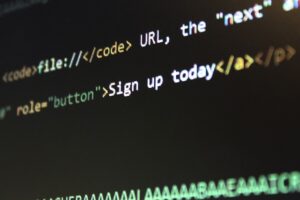Table of Contents
Have you ever desired to become an app developer in just one month? Are you new to React.js and wondering if you can learn the basics in such a short timeframe? Can you really learn it from scratch? These questions are the subject of much debate in the tech world and we all want to know the answer.
Beginning to learn a new programming language, such as React.js, can be overwhelming. It can be difficult to make a start and to know where to begin. This has been highlighted in recent surveys conducted by Udemy and Capterra, both of which discussed the need for tailored learning courses that can be completed quickly and effectively to be able to begin programming with the latest technologies.
In this article, you will learn the basics of React.js and how to apply them in a short, one-month timeframe. It will cover the fundamentals so you can begin to understand the language, as well as tips and advice for mastering React.js as quickly as possible. In addition, you’ll find resources to help you learn react such as recommended online tutorials and YouTube channels. You’ll also find suggestions on which tools and resources to invest in to further your knowledge. By the end of the month, and with hard work and perseverance, you should be in a position to create a basic web app in React.js.
Definitions of Learning React.js in 1 Month From Scratch
Learning React.js in 1 month from scratch is a challenging feat that requires a great deal of focus and dedication. React.js is an open-source JavaScript library used to create user interfaces and can be used for a variety of tasks. While learning React.js takes more than one month, it is possible to learn the basics of the library and create a functioning application within this timeframe.
JavaScript is a scripting language used to create interactive, dynamic webpages. It is used by both front-end web developers and back-end developers to create interactive components, such as animations, forms, and user interfaces.
Open-Source refers to software that is released with a license that grants anyone the right to modify and redistribute the source code for any purpose. React.js is open-source, allowing users to access the code and specialize it to meet their needs.
User Interfaces are the visual presentation of information. User interfaces both present data and allow users to manipulate data through interactions on the page. Examples of user interfaces include websites, mobile apps, and computer programs.
React.js is an open-source JavaScript library used to create user interfaces. It allows developers to create interface elements and components that can respond to data changes in real time. React.js is easy to learn and fast to implement.
Building Components is the process of building a React.js application. Components are the building blocks of React.js and are used to separate the user interface into distinct parts. Each component can have its own logic, styles, and markup.
Logic and Scripting are programming techniques used to control the user interface. Logic is used to write custom functions and features, while scripting is used to manipulate data in real-time and create user interactions.
Deployment is the process of making an application available to users. This process involves setting up an environment, testing the application, and pushing it to a live production server.
Introduction to React.js
Introduction
React.js is a popular JavaScript library used for building user interfaces and customized components that cater to interactive web and mobile applications. Though React.js is a relatively-new library, it has become immensely popular among developers due to its versatility and flexibility. Though it is possible for a complete beginner to learn React.js in a month, it would require sustained and dedicated effort.
Getting Started
To get started learning React.js, the first step is to become comfortable with JavaScript. You should learn the basics of JavaScript such as variables, functions, and concepts including objects, classes, and higher-order functions. Once you have the basics down, you can begin studying React.js and exploring its components.
Practicing React.js
Once you are familiar with the JavaScript concepts, you should begin to practice coding React.js. You can go through tutorials, build mini-projects, or download application starter-kits that allow you to quickly get up and running with React.js. It is also a good idea to join online communities and forums related to React.js development so that you can get access to additional resources and help from experienced developers.
You should also make sure to familiarize yourself with libraries and tools that integrate with React.js such as Babel, React Router, and Redux. Working on projects that use these technologies will give you a better understanding of how they work together.
Learning Resources
To learn React.js quickly, it is important to have access to a variety of learning resources. The official React.js site provides comprehensive documentation, tutorials, beginner-friendly projects, and other resources. Additionally, there are many tutorials, screencasts, and books available online that focus specifically on React.js development. There are also numerous online courses that provide step-by-step instruction on React.js development.
Tools of the Trade
To develop efficient React.js projects, you should have the right tools for the job. As a beginner, the basics such as a code editor, a web browser, and Node.js should suffice. Additionally, it is important to have access to debugging tools and libraries that integration with React.js. Examples include Chrome’s React DevTools, ESLint, and Flow.
- Become comfortable with JavaScript
- Practice coding with React.js
- Access a variety of learning resources
- Gain access to the right debugging tools
How to Learn React.js in 1 Month
What is React?
React is a JavaScript library created by Facebook developers, which is widely used for building user interfaces for web applications. It can be used to create complex single-page applications, as well as interactive elements found on regular websites.
Why React?
One of the most important reasons React is so popular is the way it allows developers to create rich, interactive websites and apps with a minimal amount of coding. With React, developers can create components which can be reused throughout an application or website, making development faster. Writing less code also helps to make projects more maintainable and easier to understand.
Using React can also make websites faster, as it works on the “virtual DOM”, which means it only renders the changes that have been made, rather than reloading the entire page each time there is an update. This improves the overall performance of the page or apps, giving users a better experience.
Finally, due to its popularity and the open source community, it’s easy to find information about how to use React, and there are lots of resources online including tutorials, online courses, books, and official React documentation.
Overall, React is an excellent tool for creating interactive web applications quickly and easily, and Google’s search rankings provide yet another incentive for using it. With the right time and effort, it is possible to learn React in one month from scratch.
Tools and Resources for React.js Beginners
Learning React.js from scratch in 1 month can be a challenging challenge, but absolutely possible. To have a successful endeavour, having the right tools and resources available before the start of the journey could prove to be beneficial. Therefore, it is crucial to know what to look out for and have a ready understanding of what to expect from the React.js journey.
Understand the Basics
The first step to learning any programming language is to understand the basics. This is no exception when it comes to React.js. As a beginner, it is important to understand the core principles and fundamentals of React.js, such as the syntax differences between other popular languages, how to work with components, and the power of JSX. To help get up to speed, there are a variety of online courses taught by experienced instructors found online.
Explore the Documentation
As the most popular web development library, there is no shortage of information about React.js. The official documentation is the best place to look for all of the different components and features of the library, as well as how to write code with it and more. Study the documentation, practice with code snippets and example projects, and familiarize yourself with the standards and conventions of React.js.
Get an Experienced Guide
Having a mentor or experienced programmer to ask questions and receive help from can be invaluable. Checking out forums such as StackOverflow can serve as a helpful resource to find answers to development related questions but the value of having an experienced resource who can answer questions more directly can prove to be far more beneficial for any React.js beginner. Mentors not only provide answers, but they also give general direction to help ensure you are on a path of success.
Conclusion
Thought-provoking question on the topic: Is it feasible to acquire and become proficient in the usage of React.js within a month? While ambitious, it certainly appears possible, although not without a sustained and concerted effort.
For those looking to make that effort, here at our blog we have recently released numerous resources and tutorials that can provide guidance and direction. Plus, periodically new tutorials are released to ensure up-to-date technologies are being learned. We encourage readers to follow us and stay informed of all our new releases.
Frequently Asked Questions
Q: Is learning React.js within one month possible?
A: Certainly, it is possible to learn React.js within a month. Gaining competence requires sustained consistency and review.
Q: What types of tutorials and resources are available?
A: Here at our blog, we offer a wide range of React tutorials and resources. Plus, we periodically update our offerings to ensure that readers are learning the most current technologies.
Q: What if I run into difficulty understanding the material?
A: If readers run into difficulty understanding any of the material presented, we have a discussion board available for readers to post any questions they may have.
Q: Is there a ‘right’ way to learn React.js?
A: There is no single ‘right’ way to learn React.js. Everyone is different and may possess a different learning style. Some may prefer visual/audio resources, while others may opt to read and demo hands-on projects.
Q: Are there any other sources that can help me learn React.js?
A: Yes! There are many other excellent resources available for aspiring React.js developers, such as YouTube videos, StackOverflow, online courses, etc. With a bit of research, readers can find the perfect resource to best suit their needs and learning style.

